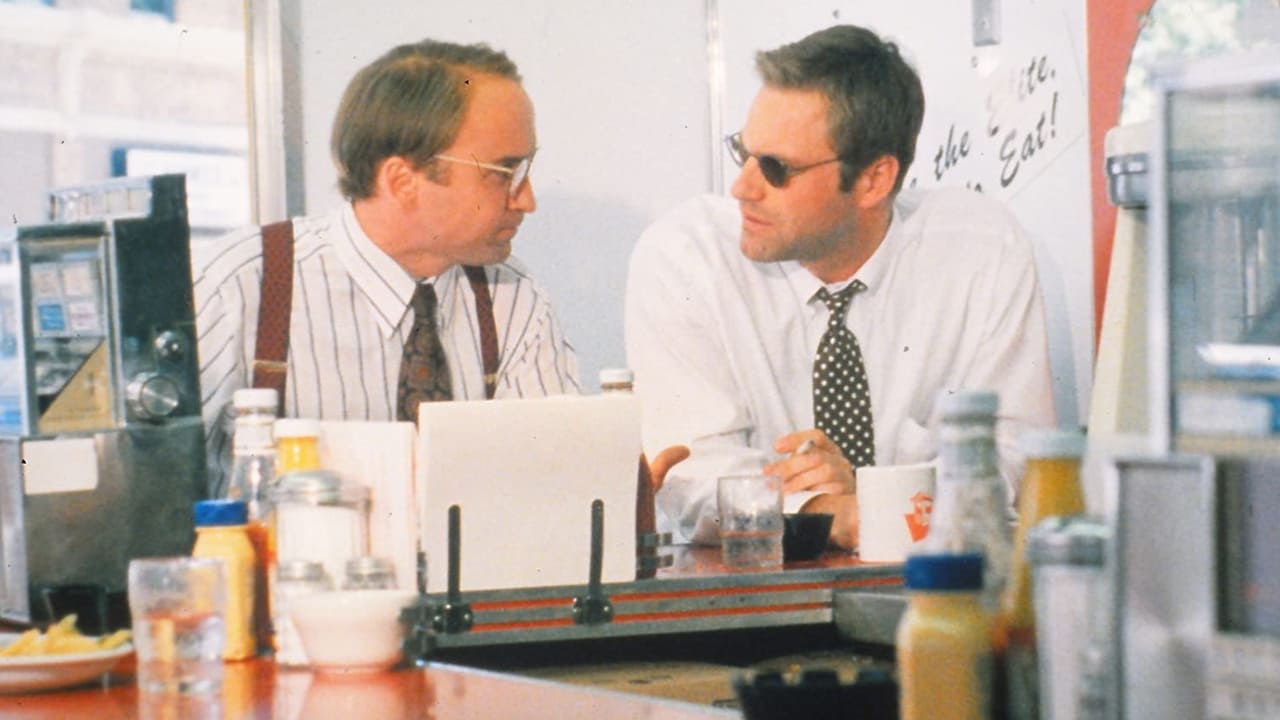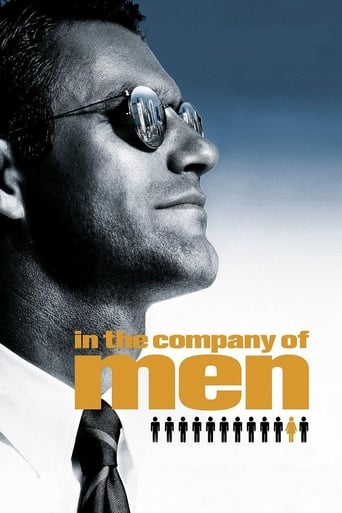tieman64
Neil Labute's "In The Company of Men" stars Aaron Eckhart and Matt Malloy as Chad and Howard, a pair of mid-level corporate executives sent to a boring regional branch for six weeks on a short term project. Frustrated, recently burnt by women, stuck in a career rut and high on corporate testosterone, the duo hatch a plan. "Let's hurt somebody," alpha-male Chad says. Pretty soon they're cooking up a Machiavellian scheme to locate an insecure woman, date her simultaneously, and dump her in the most vicious way possible. The woman they set their sights on is handicapped co-worker Christine. Christine has a speech impediment, but what she says doesn't matter to Chad anyway. Denied a voice, Chad handles her like an object to be acquired, traded, owned and discarded.Labute is heavily influenced by David Mamet. Most of the film finds Chad spewing corporate maxims, strutting about like a Master of the Universe and forcing co-workers to grovel at his feet. Eventually its revealed that Chad's scheming extends even to his "friend" Howard. He's your classic Extreme Sociopath, charming but endlessly manipulative. Everyone's his puppet. And as with Mamet's "workplace flicks", Chad's less a character than an extreme manifestation of a corporate logic whose drive for profit, ownership and expansion slowly infects how everyone around him thinks, acts and feels. Eventually Chad becomes both a norm and standard to aspire to. He's the new hypermasculinist ideal, for whom humiliation, domination, degradation, exploitation and suffering conflate with success. It's not only that aggressive competition in business affects masculinity, romance and sexual behaviour, but that corporate logic magnifies power, the ego and sanctions what is essentially various forms of rape. This stance is the opposite of how contemporary ideology is (mis)perceived, in which "business" is seen to be "neutral" and "mutually beneficial".Chad's a character who's popped up in many films and stories. More interesting is Howard, a fairly meek guy who is corrupted and made to do things even more horrible than Chad. The real world is made up of Howards. Chad's the anomaly, existing always more as spirit or underlying drive.La Bute penned "The Shape of Things" as an attempt to reverse the gender roles of "Company". Arguably his best film, it's also part of a tight trilogy by Labute about people's perceptions of physicality ("Fat Pig", "Reasons to be Pretty", "Shape of Things"). Massive spoilers ahead."The Shape of Things" initially unfolds like a conventional romantic comedy. We're introduced to a dishevelled English Literature student called Adam, played by the always likable Paul Rudd, and an attractive art student called Evelyn (Rachel Weisz). The film then becomes a modern version of Adam's seduction by Eve. Eve ensnares Adam, manipulates him into becoming "fit", "attractive" and "healthy", and then reveals that she has never had romantic feelings toward him; she was merely using Adam as a sort of living art installation, a clay puppet, deceptively sculpting and moulding his mind and body. When Eve reveals her scheme to Adam – she invites him to an art installation in which he is quite literally presented as an exhibited object, her gaze now likened to the masculinist gaze of "In The Company of Men" - he's dumbfounded. Eve's tricked him into getting cosmetic surgery and altering his personality and physique. She's reconstructed him. Treated him as a chunk of malleable flesh.Unlike "Company", we're then invited to work our way through the messy ethical minefield of the victimiser's actions. For while Chad deservedly gets no sympathy in "Company", the relationship in "Things" is much harder to work out. Is Adam now a better person? Was Eve's love, no matter how virtual, beneficial to Adam? Was it ever real? How much authority should be given, or do we give, to artists? How much ethical responsibility do they hold or exercise? How do power relationships within romantic couples overlap with the power we grant artists? Don't Eve's actions echo the sexism of "Compny"? What is acceptable artistic material? Do the means, in art, justify the ends? At what point does creation become manipulation, is manipulation ever justified and at what point does creation destroy (see "Vertigo")? Is Adam now a beautiful work of "art" despite Eve's actions? How do Eve's actions differ from other vampiric artists, who take from and/or abuse outside sources? What does the film say about romance and the lover's desire to alter their partner? Art may be made by monsters, but what about the audience who enjoys? And on and on it goes.The film features a shot of the sentence "There is no morality in art". The quote's by Chinese novelist Han Suiyin, and is stencilled over Eve's art gallery. Throughout the film Eve articulates a similarly postmodern stance: "it's all subjective", she says, "moralists have no place in an art gallery". The firm itself is structured, we think, as an artist's apologia. Its first scene portrays Eve as an iconoclast who thrice breaks the rules, stepping over a rope at a museum, taking an illegal photograph of a sculpture and painting a penis onto a statue which has been censored by uptight museum curators. "You stepped over the line, Miss," curator Adam prophetically says when he firsts meets her. But as Eve makes clear, there should be no lines. We agree with her for much of the film. Afterall, hasn't she liberated Adam? By the film's end, however, we're asked to reconsider Eve's stance. Labute himself reconfigures Han Suiyin's quote. It's not that "there is no morality in art", in the sense that morality should not apply to art, but more literally, that "there is now, no longer, morality in art". Artists have no ethical compass, social feeling or attachment toward world, community or fellowman. Such art doesn't only exist in a vacuum, but is inherently selfish and nihilistic. You know, like Chad. 8/10 - Worth one viewing.
michelejohn53
Chad is a perfect example of a sociopath/psychopath, someone who is amoral, takes risks in his personal and work life, is utterly charming when he is working on someone, but cold and and cruel when he no longer needs them. I thought this film was a brilliant portrayal of the psychopath and how he draws in his victims. Lying is second nature to him, he takes everything in his stride because he has no emotional response to anything that transpires. Chad is in control and it is almost hypnotic to see him manipulate those around him.There was another thread running through the story, the office politics, and Howard appeared to have missed what was really happening - just like a real life victim, he would not have realised just how evil Chad is.Definitely one for my collection of films about psychos.
tonysx
In the Company of Men is an incredibly disturbing exploration of men, woman, relationships, race, and corporate America. Neil LaBute's debut film as writer and director was billed as an independent dark comedy but may just as well been a Monster Movie. Chad played by Aaron Eckhart is one of the most haunting characters ever put on film. He is no creature or serial killer however but far more frightening. Chad is a good-looking, successful, charismatic, businessman who has absolutely no regard for anything or anyone in his life. Eckhart's portrayal is extremely convincing. You believe him when he is trying to be sincere and are sickened when he reveals his true nature. The film takes place when Chad and his introvert friend and coworker, Howard, have to go away on business to a small town for 6 weeks. Chad having just gone through a break up along with Howard decides the two should simultaneously date an innocent unsuspecting woman while on the trip. After they both win her over they will break her heart and go back to their normal lives with the satisfaction of hurting a woman the way they have been hurt. Chad finds the perfect candidate almost immediately in the quite pretty deaf girl Christine at their temporary office. The plot seems so translucent at this point. The two will obviously start to have real feelings for Christine, she will find out about the game they were playing and leave them before ultimately realizing she really loved one of them and then they will kiss on a beach in the last shot. Sounds like a job for Zack Efron and Hillary Duff. Fortunately this film is not all the way it seems. There is layer after layer of development. The friends and their disgusting plot of misogyny is only the surface of this film and without revealing any details it is far from the happy ending I expected. The film delves into the world of corporate America and the class and racial structure of business. The employees shown on the "big project" are white males and the lone young black businessman is forced into a brutally humiliating act to prove his worth. The women are secretaries or typists. It is also fitting that the company and there actual area of business is never even mentioned. The filmmakers disclose no details on the project or even the locations. This story isn't meant to show a small minority of a certain type of company or employee but a broad depiction of the structure of American business. Neil LaBute is brutally effective in this film and it should not be missed.

